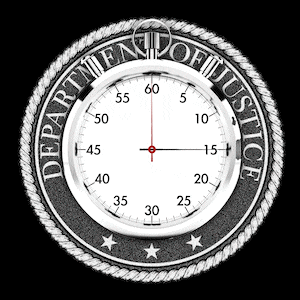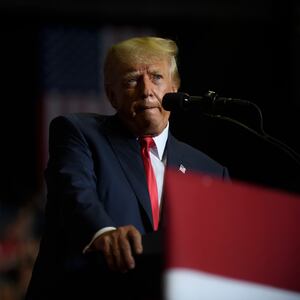The Justice Department’s decision to take former President Donald Trump as (essentially) its client, defending him in the writer E. Jean Carroll’s defamation suit, has put DOJ in the awkward position of not only investigating its own client for potential criminal conduct—but also contradicting its client’s other lawyers.
This is a mess of DOJ’s own making, and one that should be self-remedied, quickly.
Carroll is suing Trump for defamation over his denying having raped her in 1995—and plans also to sue him directly for the alleged rape under New York State’s Adult Survivor’s Act, which opened a one-year window for the filing of lawsuits over sexual assaults, even if the usual time limits for bringing a lawsuit have expired.
Despite the fact that this alleged crime would have occurred decades before Trump became president, former Attorney General Bill Barr—always on the lookout to use DOJ to help Trump—decided to intervene in Carroll’s defamation suit, under a law that allows the federal government to substitute itself as the defendant in a case against a federal employee who gets sued for acting within the scope of their job.
Barr’s theory was that since Trump made the denials while he was president, then he must have been acting within his official capacity when he denied raping Carroll. Given the chance to disavow this strained reading of the law, Attorney General Merrick Garland’s DOJ, instead, doubled-down on it. It even fought for the right to defend Trump up to the federal Second Circuit Court of Appeals, which agreed with DOJ’s position on the matter.
Garland’s decision to side with Bill Barr—presumably made while Garland was wearing his institutionalist cape—might have been merely distasteful if not for the Mar-a-Lago search warrant and ongoing criminal investigation. But critical to DOJ’s rationale that it can represent Trump—and what the Second Circuit agreed about—is that Trump was a federal employee when he made the allegedly defaming statements.

Attorney General Merrick Garland
Drew Angerer/Getty ImagesBut that is not what Trump’s other lawyers think, as evidenced by a May 25 letter from Trump lawyer Evan Corcoran to DOJ denying that the President of the United States is a federal employee. Corcoran argued to DOJ that Trump could not possibly be criminally liable for mishandling classified information, because DOJ would have to prove beyond a reasonable doubt that Trump was an “officer, employee, contractor, or consultant of the United States” and “The President is none of these.”
This inconsistency carries with it more than just embarrassment for DOJ.
As already noted, it may afford Trump defenses in other civil actions brought by victims of the violence on Jan. 6, but it also creates potential problems with DOJ’s criminal investigation into the removal and handling of national security information involving Trump’s actions at Mar-a-Lago.
Trump and his lawyers have already cast aspersions on the integrity of DOJ and the FBI, suggesting evidence may have been planted, and raising the possibility that various investigators may have to be disqualified if they were tainted by exposure to information that the special master assigned to the case may decide they should not have seen.
The fact that DOJ is, at once, defending Trump and potentially investigating him for criminal charges is a no-brainer conflict of interest argument, and one which Trump’s legal team may use in his defense.
And from a legal analysis, the difference in opinion between Trump’s lawyers over whether Trump is a federal employee is no mere esoteric legal issue. Rather, the question of whether Trump is a federal employee is critical to whether DOJ can defend him in the Carroll suit and critical to whether Trump might face criminal exposure under federal criminal law.
Of course, DOJ has likely been thinking this through as well. AG Garland is, after all, a former federal court of appeals judge, and likely has good arguments about why this awkward but rare situation is not a true conflict of interest.
One solution might be for DOJ to appoint a special counsel to handle the Carroll defense, since that is an easier case to segregate than the investigation involving Mar-a-Lago. Another solution would be for DOJ to disavow former AG Barr’s decision, and withdraw from defending Trump in Carroll’s defamation suit.

E. Jean Carroll
Alec Tabak/New York Daily News/Tribune News Service via Getty ImagesEither of these solutions—as well as simply doing nothing—will likely be subject to challenges and the inevitable delays accompanying litigation of the issues.
But withdrawing from the Carroll case is the best option—because it erases one of Barr’s attempts to use DOJ as a political weapon.








